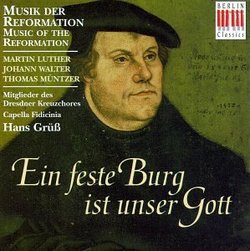| All Artists: Johann [1] [Composer] Walter, Thomas Muntzer, Antoine de Fevin, Martin Luther, Caspar Othmayr, Josquin Desprez, Hans Gruss, Ulrich Shicha, Dresden Kreuzchor, Capella Fidicinia Leipzig, Dresdner Kreuzchor Title: Musik der Reformation: Ein feste Burg ist unser Gott Members Wishing: 1 Total Copies: 0 Label: Berlin Classics Release Date: 4/23/1996 Genres: Special Interest, Classical Styles: Opera & Classical Vocal, Chamber Music, Historical Periods, Classical (c.1770-1830), Sacred & Religious Number of Discs: 2 SwapaCD Credits: 2 UPC: 782124911928 |
Search - Johann [1] [Composer] Walter, Thomas Muntzer, Antoine de Fevin :: Musik der Reformation: Ein feste Burg ist unser Gott
 | Johann [1] [Composer] Walter, Thomas Muntzer, Antoine de Fevin Musik der Reformation: Ein feste Burg ist unser Gott Genres: Special Interest, Classical
|
Larger Image |
CD Details |
CD ReviewsA musical tour de force, and a time machine Andrew G. Lang | Cleveland, OH USA | 04/03/2000 (5 out of 5 stars) ""Music of the Reformation" is not only a tour de force by two of the great ensembles of eastern Germany (the famous choir of men and boys at Dresden's Lutheran Church of the Holy Cross, and the Capella Fidicinia of Leipzig which performs on original and reconstructed Renaissance instruments), it's also a journey through music into one of the great conflicts of the Reformation: the struggle between Martin Luther and the radical priest, Thomas Muentzer.The liturgical poetry of both Reformers is juxtaposed in this two-CD collection. Muentzer took the Bible's vision of social equality literally and became a leading figure in the famous "Peasants' Revolt" that was eventually crushed by the combined forces of Germany's Protestant and Roman Catholic princes. Luther, who remained loyal to his patrons in high places, savagely denounced the rebels in a tract titled "The Murdering, Thieving Hoards of Peasants." Muentzer occupied a special place in Luther's gallery of theological horrors. When the Peasants' Revolt foundered, both Muentzer and his writings were obliterated; but some of his music survived. Surprisingly, Muentzer's musical style is the more conservative of the two. He translated the traditional texts of the Latin Mass and Divine Office into contemporary German but then set the new words to traditional Gregorian melodies and psalm tones. Luther, who was more sophisticated musically, turned his texts over to the most advanced composers of the day. Muentzer's monodic chants and the rich polyphonic treatments of Luther's liturgical poetry are communicated brilliantly in performances that are technically nearly perfect. Fans of Gregorian chant should compare these down-to-earth German interpretations of the traditional forms with the more fluid style inspired by Solesmes. But emotion is not absent from these recordings: particularly in the compositions by Luther's friend, Johann Walther, the choir and instrumentalists bring the listener to the intensity of religious ecstasy the composer (and the Reformer) intended. These may be some of the finest religious compositions of early Renaissasnce polyphany.The collection is issued by "Berlin Classics"--which has created a new market based on the archives of "VEB Deutsche Schallplatten"--the former state-owned recording company of the now-defunct German Democratic Republic. These recordings were first-rate technically and have been digitally remastered for the new technology."
|

 Track Listings (14) - Disc #1
Track Listings (14) - Disc #1